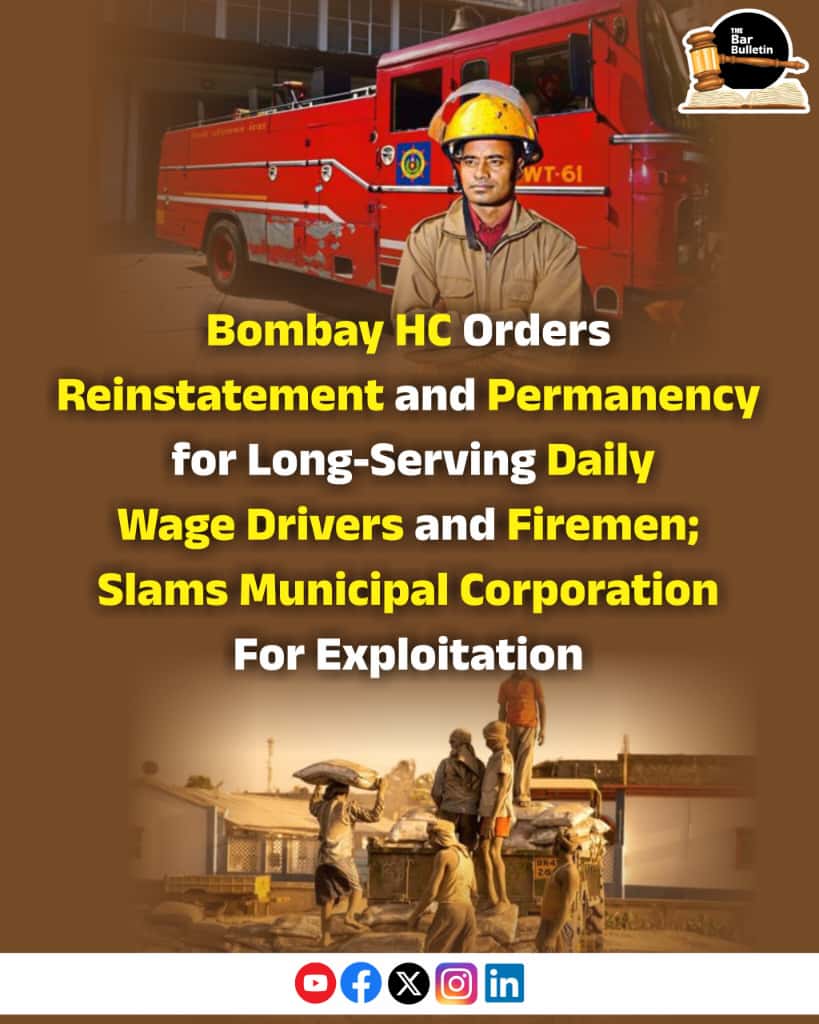The Bombay High Court allowed four writ petitions, setting aside termination orders, and ordering reinstatement for the petitioner drivers and firemen, with back wages and continuity in service.
The petitions were filed by drivers and firemen who had been continuously employed on daily wages since 2016-17. They served in critical municipal roles, often working side by side with permanent staff for nearly nine years, only receiving technical breaks on paper. The Malegaon Municipal Corporation repeatedly cited government limitations on staffing and establishment expenditures exceeding 35% of annual revenue to justify contractual status and avoid regularization, despite the sanctioned staffing pattern providing for these posts.
Initial ad-hoc appointments of the petitioners were extended periodically. When they filed complaints for regularization, they received interim protection. The Industrial Court ultimately dismissed their complaints on 6 May 2025, citing government resolutions limiting establishment expenses. The Corporation terminated them on 2 July 2025, prompting the instant writ petitions.
Petitioners argued that prolonged, uninterrupted service in essential posts justified permanency, and challenged their termination on 2 July 2025, as unfair and contrary to law under the Maharashtra Recognition of Trade Unions and Prevention of Unfair Labour Practices Act, 1971 (MRTU & PULP Act), especially when their complaints were pending.
Petitioners argued that the Corporation’s actions amounted to exploitation and arbitrary denial of statutory rights, especially as their duties mirrored those of permanent workers. The Corporation claimed helplessness due to government restrictions on appointments and expenses.
The Bench comprising Justice Milind N. Jadhav rejected the financial constraint defense, stressing judicial scrutiny for arbitrary refusals and noting that continued employment indicated actual necessity for permanent posts. Citing recent Supreme Court judgments in Dharam Singh v. State of UP[1], the Court emphasized that prolonged ad hoc or daily-wage engagement for essential duties is unconstitutional and amounts to unfair labour practice.
The Court found that the denial of permanency violated Articles 14, 16, and 21 of the Constitution. It held that budgetary restrictions and lack of recruitment rules cannot override workers’ statutory entitlements. Relying on Conservator of Forests v. Savala Dhondiba Pise[2], the Court reasoned that irregular (but not illegal) appointments can be regularized, and interim orders do not eliminate substantive rights.
The Court quashed both, the Industrial Court’s orders and termination actions, ordered immediate reinstatement and directed continuity of service and payment of back wages from the date of termination until reinstatement. The petitioners were also held as entitled to all benefits of permanent employees prospectively.
Cases relied on:
1. Harbhan Singh and Ors. v. Bhakra Beas Management Board and Ors., CWP-6843-2020 (O&M) decided on 09.09.2025
2. Conservator of Forests and Anr. v. Savala Dhondiba Pise, Writ Petition No. 3274 of 2002 decided on 08.09.2010
3. Dharam Singh and Ors. v. State of U.P. and Anr., Civil Appeal No(s). 8558 of 2018
Appearances:
Ms. Pavitra Manesh, Advocate for Petitioners.
Mr. S.S. Patwardhan, Advocate for Respondent – Corporation.
[1] Civil Appeal No(s). 8558 of 2018
[2] Writ Petition No. 3274 of 2002 decided on 08.09.2010



